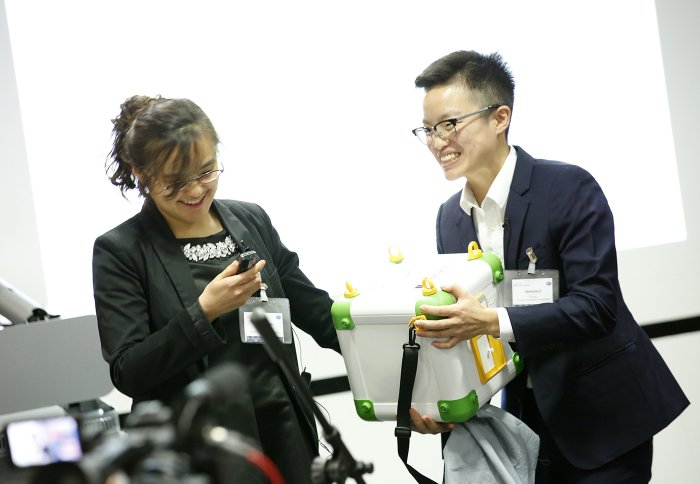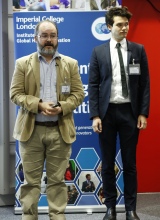'Last mile' child vaccine cooling system wins Student Challenges Competition
by Jo Seed

Winners Kitty Liao Abellona U showcasing their innovative vaccine cooling system.
Seven finalists entered the Dragon's Den to secure funding for their idea to improve global health.
A new way to store and cool vaccines during the last mile of their journey to the clinic claimed the £5000 in this year's Institute of Global Health Innovation's Student Challenges Competition.
The competition, which is now in its fifth year, provides a platform for UK-based students to showcase their global health research ideas and secure funding to develop it to the next stage.
The University of Cambridge’s Kitty Liao and Imperial College London’s Abellona U claimed the first prize which will go towards their start-up company ‘Ideabatic’. Their life-saving vaccine cooling and delivery system ‘SMILE’ aims to deliver vaccines to the 19 million unvaccinated children living in the most remote areas of the world.
According to the World Health Organisation, every year, two to three million children die of vaccine-preventable diseases and in 2016, there were 19.4 million children who are unable to receive basic vaccinations. One of the main contributing factors to these figures is that the cool boxes currently used for delivering vaccines to the most remote regions, termed ‘the last-mile journey’, are inadequate. A typical last-mile journey takes between two to seven days. However, the cool boxes currently used can only maintain vaccines to be within the required temperature range of two to eight degrees Celsius for up to 14 hours. As a result, 20 to 50 percent of the vaccines are spoiled during the last-mile journey, which amounts to an annual total of 600 million dollars’ worth of vaccines being wasted globally. Ideabatic is developing SMILE, a smart last-mile vaccine delivery system to address this issue.
“I founded Ideabatic with a vision to solve global challenges with innovations and to further develop SMILE- Smart Last-Mile Vaccine Cooling and Delivery System for the Developing World. We are raising funding and building a consortium to optimise and launch SMILE. Please join us to reach every child no matter how difficult the journey is.” said winner Kitty Liao, 1st year postgraduate student within the Judge Business School at the University of Cambridge.
Winner Abellona U, first year PhD student in Clinical Medicine Research at Imperial said “We are very grateful to IGHI for organising this competition and encourage students to work on innovative solutions to tackle global health challenges. We will work hard to bring SMILE to the real world!”
Kidney care
 Runners up Jez Marston and Robert Learney from ‘Accunea’ won the £2500 prize money. Their aim is to develop real-time monitoring platform technology for early detection of acute kidney injury in patients after surgery.
Runners up Jez Marston and Robert Learney from ‘Accunea’ won the £2500 prize money. Their aim is to develop real-time monitoring platform technology for early detection of acute kidney injury in patients after surgery.
“Competing in the Student Challenges Competition was a great way to test our idea and raise awareness around the need for innovation in kidney care worldwide. Both the application step and the final pitching event pushed us to refine our message and value proposition in improving global health” said Jez and Robert.
Audience Choice
 The Audience Choice Award went to Stephanie Hodgson, Istvan Ferrier, Vikram Palit and Max Renna for ‘CorVision’ an innovative and affordable screening tool that provides accurate and early detection of congenital cardiac disease (CCD) in newborns.
The Audience Choice Award went to Stephanie Hodgson, Istvan Ferrier, Vikram Palit and Max Renna for ‘CorVision’ an innovative and affordable screening tool that provides accurate and early detection of congenital cardiac disease (CCD) in newborns.
"Our journey through the IGHI competition has been a fantastic opportunity to develop CorVision further and really focus on the global health effect that this device could have. Throughout the competition process, we were able to better understand the problem of poor and late diagnosis of congenital cardiac disease, especially in developing regions. We are happy to have been awarded the Audience Choice Award, and this has given us the confidence (and capital) to take CorVision to the next level - and hopefully build a prototype. Our hope is that CorVision can help save the lives of vulnerable children around the world, through facilitating early screening and diagnosis".
Other finalists covered a range of topics including Salman Mailk from the University of Manchester, who aimed to revolutionise particle manufacture for pharmaceutical & research industries. Imperial’s Laura Mitchell, Chun Man Chow, Emily Groves, Raghd Rostom and Simon Wiegrebe offered a new way to provide low-cost access to diagnostic testing, whilst Azuolas Ciukas and Mantas Matjusaitis from the University of Edinburgh presented ‘CellAge’ which aims to improve human lifespan & reduce the incidence of age-related diseases. Imperial’s Mingxia Wang also offered a way to non-invasively monitor intracranial pressure.
The Dragons
 The finalists pitched their ideas to four expert judges - Dr Richard Smith - IGHI Adjunct Professor, Chairman of Patients Know Best, Director of the UnitedHealth Chronic Disease Initiative, former Editor of the British Medical Journal and Chief Executive of the BMJ Publishing Group; Professor Simone Buitendijk – Imperial Vice-Provost for Education; Dr Will Cavendish – Strategy Lead, Applied at DeepMind; Dr Mark Hammond – Founder, Deep Science Ventures.
The finalists pitched their ideas to four expert judges - Dr Richard Smith - IGHI Adjunct Professor, Chairman of Patients Know Best, Director of the UnitedHealth Chronic Disease Initiative, former Editor of the British Medical Journal and Chief Executive of the BMJ Publishing Group; Professor Simone Buitendijk – Imperial Vice-Provost for Education; Dr Will Cavendish – Strategy Lead, Applied at DeepMind; Dr Mark Hammond – Founder, Deep Science Ventures.
It was a fantastic event with a huge range of projects and what was really great to see was the varied mix of students from Universities across the UK.
– Professor Guang-Zhong Yang
Deputy Director, Institute of Global Health Innovation
Deputy Director of IGHI and Chair of the competition Professor Guang-Zhong Yang, said: “It was a fantastic event with a huge range of projects and what was really great to see was the varied mix of students from Universities across the UK. I am looking forward to hearing updates on the projects and their real world impact and would like to take the opportunity to thank all our finalists for pitching their ideas and sharing their insights. We look forward to receiving even more applications next year as we continue our search for the next generation of global heath innovators”.
Further info
Article text (excluding photos or graphics) © Imperial College London.
Photos and graphics subject to third party copyright used with permission or © Imperial College London.
Reporter
Jo Seed
Institute of Global Health Innovation
